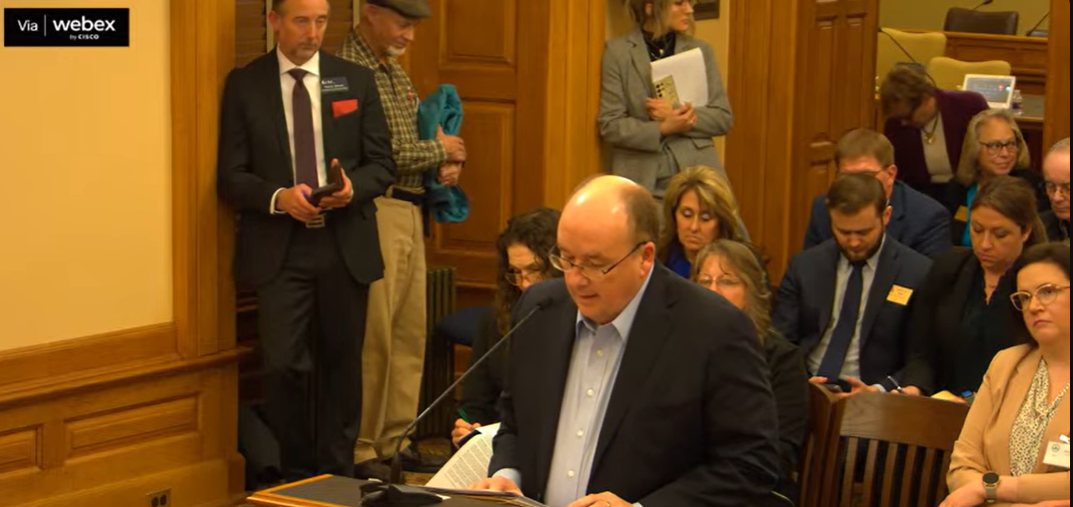Get in touch
KanCare Oversight Testimony
October 11, 2023
October 11, 2023
KABC Director Dan Goodman provided testimony to the Robert Bethell Joint Committee on HCBS and KanCare Oversight asking the committee to recommend several opportunities to improve and innovate existing services to improve the lives for older Kansans.

The Kansas legislative session is in full swing, making it the perfect time to engage with your lawmakers and advocate for policies that improve long-term care in our state. Whether you're a seasoned advocate or just getting started, knowing how to effectively communicate with legislators is key to making a difference. We believe that every voice matters, and lawmakers want to hear from the people they represent. To find your legislator, visit the Kansas legislative website. When you visit www.kslegislature.org , there is an option on the left side of the website to “Find Your Legislator”. You may search by name, chamber, party, or select “Seach by Your Address”. This will lead you to Plural , a platform to find bill information and your local legislators by typing in your home address. Tips for Effective Advocacy Be Friendly – Legislators are people too! Approach them with sincerity and honesty. While time may be limited, be sure to focus on the issue you're there to champion. Be Prepared – This is your chance to educate. Start with a clear, concise explanation of the issue, and provide only factual information. Be Respectful – Not everyone will agree with your position. Some lawmakers may have concerns about costs, feasibility, or other factors. Treat them with respect, as they may be allies on future issues. Be Direct – Answer questions openly and honestly. Share the full picture, including both the challenges and the solutions. Ask for a Specific Action – Make it clear what you want your legislator to do. Common advocacy actions include: Sponsoring a bill Urging committee leadership to take action on a bill Speaking for or against a bill during debate Holding a public event to raise awareness Writing a letter to state agencies about oversight and implementation of a law Establish a Relationship – Don't just reach out when you need something. Contact your legislators regularly, thank them when they support your issues, and stay engaged. Building a relationship increases the likelihood they will listen when you advocate for change. Say Thanks – Gratitude goes a long way! Always follow up with a thank-you note or email after a meeting, even if the legislator disagrees with your position. Advocacy is about persistence, education, and relationship-building. By using these strategies, you can help ensure that long-term care remains a priority for Kansas lawmakers. Want to learn more? Check out KABC’s full Advocacy 101 guide here .

On Thursday, January 30th, Dan Goodman, Executive Director, presented testimony before the House Social Services Budget Committee. His remarks focused on essential recommendations for the Kansas Department of Aging & Disability Services (KDADS) budget, underscoring the urgent need for a Statewide Resource Guide for Older Kansans. Dan’s testimony emphasized Kansas’s rapidly aging population, with projections showing that more than 20% of Kansans will be 65 or older by 2030. With state resources already stretched thin, KABC urged the committee to prioritize investments in solutions that diversify and enhance access to long-term care services across Kansas. Highlighting the Statewide Resource Guide KABC’s flagship recommendation was a comprehensive Statewide Resource Guide for Older Kansans, modeled after the highly successful Douglas County Senior Resource Directory. The proposal seeks $190,000 to develop and distribute a directory that would serve as an essential tool for older Kansans and their families. The funding would cover: Initial Setup & Information Coordination: $85,000 One-Time Master Printing for Statewide Distribution (35,000 copies): $105,000 The guide would provide accurate, accessible, and up-to-date information on long-term care services and resources, with an online version that could be printed on demand. This initiative aligns with the Senior Care Legislative Task Force’s final recommendations and would empower Kansans to make informed decisions about care options. Dan emphasized the proven success of the Douglas County Senior Resource Directory, which KABC developed with grant funding through the Douglas County Community Foundation. Since its launch, the directory has been accessed online by over 700 individuals and distributed to hundreds of older adults, caregivers, and local businesses. Expanding this model statewide would ensure that every Kansan—regardless of where they live—has access to vital information when they need it most. Other Budget Priorities KABC Supports KABC also backed several of KDADS Governor’s budget recommendations, including funding increases for: HCBS Frail Elderly Waiver Growth HCBS Brain Injury Waiver Growth Nutrition Services Incentive Program Stay tuned for updates as we continue to advocate for these critical investments during the legislative session!




